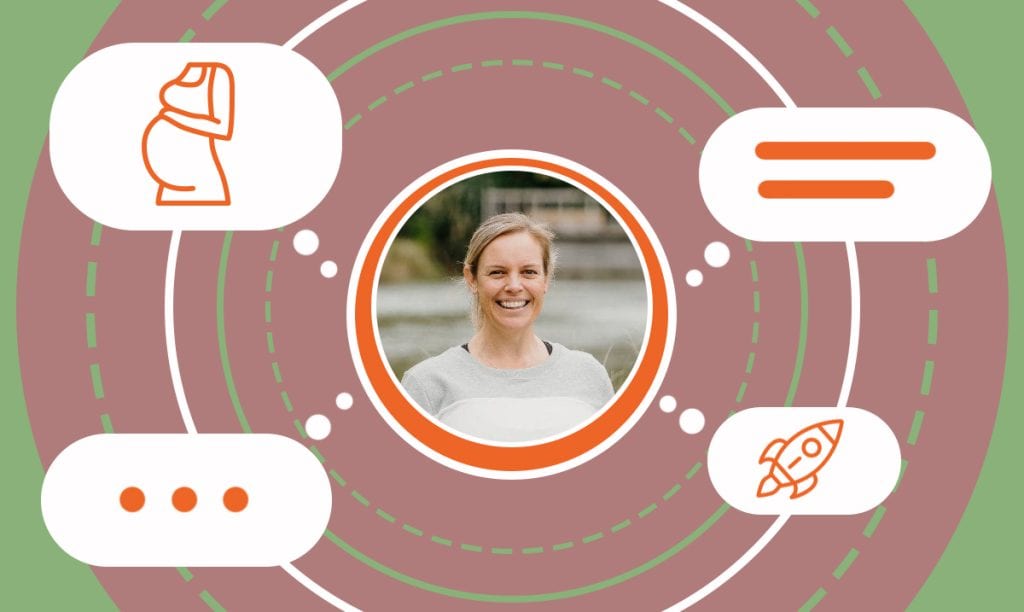If you’ve ever struggled with cold feet in bed or while lounging, CozyFeet might be the perfect solution. Founded during the pandemic by CorinneO& ...
Lewis Smith’s Blueprint for E-Commerce Success
Written by: Esther Strauss
Esther is a business strategist with over 20 years of experience as an entrepreneur, executive, educator, and management advisor.
Published on February 27, 2024

The e-commerce market in the UK continues to trend upward, with over 80% of the UK regularly purchasing products online. Behind this growth, there’s an untold story: thousands of first-time business owners are capitalizing on this trend by starting their own e-commerce businesses.
Lewis Smith, a leading figure in dropshipping training and founder of Dropship Unlocked, the premier online e-commerce courses platform in the UK, is one of the UK’s leading figures inspiring this e-commerce revolution. He mentors thousands of aspiring business owners through his thriving online community, UK top 20 podcast, and speaking on stages worldwide alongside business titans like Steven Bartlett.
In this interview, we’ll dive into the strategies that allowed Lewis to stand out in what many perceive as an oversaturated field, the circumstances that led him to discover e-commerce, and why he stands by this business model despite the wide range of choices available to aspiring entrepreneurs.
Catching the Entrepreneurial Bug
SBS – Can you share the story of how your business journey began? What inspired you to start it?
Lewis – After finishing school, I initially believed in the “traditional” path: attending university, getting a decent degree, and working up the corporate ladder. Of course, we all know it usually doesn’t quite go that smoothly.
My day job was in medical supplies, and it didn’t take long for the novelty of being an adult with a “proper job” to wear off. The daily routine quickly became monotonous and unfulfilling. Every day was the same, and it became apparent that ascending the ranks wouldn’t happen anytime soon. I was stuck, craving more financial security and the time to do the things I wanted to do before I was too old to do them.
There were places I wanted to go and sights I wanted to see. It wasn’t about having money as much as having freedom, and I knew that one way of getting that freedom was by starting a business of my own. I certainly liked the sound of that, but I had absolutely zero knowledge of how to get set up, let alone start earning.
Exploring the Options
SBS – How did you go about researching your options? Did you set your heart on e-commerce from the word go?
Lewis – In my free time, I started reading up on all the different business models, often thinking, “Ok, this is the one for me,” then getting increasingly confused, discarding that option and starting the cycle again. At one point, I even had an idea for an app for healthcare professionals, where there was genuinely a gap in the market, but I quickly realised how in over my head I was with no tech skills and not a lot of capital to work with.
It was exhausting, and the last thing I wanted to do was create a business that demanded even more of my time than my 9–5, even if I was earning more money. After all, what’s the point of having a healthy bank account if you can’t spend any of it because you now have no free time?
Settling on E-commerce
SBS – So, why exactly did you settle on e-commerce in the end?
Lewis – My e-commerce journey began after reading The 4-Hour Workweek by Tim Ferriss. It wasn’t just the allure of e-commerce that captivated me but specifically the model of dropshipping for beginners, which seemed to be the perfect entry into the online business world without the need for substantial upfront investment. I know it might sound clichéd, but that changed everything for me.
The book taught me about the potential of e-commerce, but more importantly, it was where I discovered the idea that I could run a business while having the dream lifestyle I imagined for myself and my wife. We could live in other countries and tick off our collective bucket list without constantly worrying about our finances. From then on, I realised that e-commerce was the path to the freedom I craved.
The model of dropshipping mentioned in that book caught my attention. It is a low-cost entry to e-commerce that is ideal for beginners like me with limited startup capital. Dropshipping was ideal for me with a student loan and a job where I earned less than £30K a year. The learning curve wasn’t too unforgiving, and I could run it from anywhere worldwide as long as I had my laptop.
Teething Problems
SBS – So, what was your experience heading into the e-commerce world as a newcomer? Did everything go as you’d expected, in line with your research?
Lewis – Naturally, I wasn’t expecting to hit a button and become a millionaire overnight. Thankfully, I wasn’t wearing rose-tinted glasses, but I didn’t realise that things wouldn’t go as smoothly as the gurus made out online. Ironically, my mistake was trying to follow the same process everyone else was using.
The traditional model, often discussed in online business courses, involves sourcing low-cost products for a markup — a challenging aspect many e-commerce courses online highlight. You keep what’s left over after paying all of your expenses. That’s how it works in theory.
However, I naively didn’t think about the small print that comes with that: waiting as long as a month for delivery. There is no guarantee that the products will match the online descriptions or even arrive. There was also no way of checking the quality of my products.
Perhaps unsurprisingly, my days were spent replying to customer complaints, as people demanded refunds for the poor-quality products they received (or didn’t receive).
I remember reading that around 90% of e-commerce stores fail within their first four months. These major issues are why!
Adapting the Dropshipping Model
SBS – Did you eventually overcome the initial speed bumps, or did you ultimately just get used to them?
Lewis – Even if I’d managed to secure next-day delivery from China and guarantee high-quality products by some miracle, my business would still have been destined to fail because my profit margins were so small.
I would have had to sell crazy amounts of products, which just wasn’t going to happen, and even if it did, that would mean a vast number of potential customer complaints. I knew I needed to dramatically shift the way I ran my business if I was ever going to unlock the life of freedom that I wanted.
I had two problems to solve simultaneously. The first was to make my business a better place for my customers, with high-quality products and minimal wait time. The second was to make it fit my ideal lifestyle and generate a higher income without being glued to my laptop. So I set to work, seeing what was possible.
A Whole “New” Way of Doing E-commerce
SBS – Given that you’re sitting here with multiple stores still in operation and over £5M in revenue, things must have picked up. What happened?
Lewis – After sinking hours into research, I settled on making two significant changes to my business, ultimately going against the grain and what similar business owners were doing: I stopped shipping from China, switching to the UK instead, and I stopped selling inexpensive products en masse, instead opting for high-quality, high-ticket dropshipping products, where I’d need fewer sales to hit my target income. I started referring to this little switch as The Home Turf Advantage® — and the name stuck.
What I soon came to realise is that this is the exact method high street giants use. Tesco, Argos, you name it, this is how businesses get products to customers quickly and efficiently with minimal customer complaints.
Newer businesses like Wayfair have used this model to ensure they never had to create brick-and-mortar stores or warehouses. It’s pretty genius when you think about it.
The UK E-commerce Revolution
SBS – Compared to working with suppliers from China, how did you find working with UK suppliers?
Lewis – First off, I’ll say that working with UK suppliers was a game-changer.
It revolutionised my approach, tapping into the best e-commerce platforms for dropshipping that prioritise local, quality products and swift delivery.
Not waiting 30 days or more for delivery was already a plus. I ultimately found suppliers who offered next-day delivery, eliminating many of the customer complaints I was getting immediately.
However, finding UK suppliers isn’t easy, especially when you first get started, and this is one of the questions most newcomers ask me. Finding products from China is easy because you can use wholesale sites like AliExpress or Temu. However, since I was now in the same time zone as suppliers and spoke the same language, all it took to start a conversation was a simple email or a quick phone call. Sometimes, I even met potential suppliers for a casual coffee.
From Fidget Spinners to Furniture
SBS – And how did you find swapping out low-priced products for high-ticket products?
Lewis – For starters, my customers received high-quality goods the day after ordering them, which meant my inbox stopped blowing up with people unhappy that they hadn’t received their order or that it had arrived broken. Selling high-ticket also generated higher profits per sale, meaning I needed to sell fewer products to achieve my dream lifestyle.
When my business took off, I had the time and financial security to travel with my wife and live in some of our bucket list destinations like Vietnam, Thailand, Mexico, Dubai, and Bali. That’s when I truly believed my Home-Turf Advantage Model® was a successful long-term business model.
Maintaining a Successful Business Overseas
SBS – With all that traveling and spending time permanently outside the UK, how easy was it for you to maintain the running of your business?
Lewis – I think this is the part where everyone expects me to say that I’m constantly checking my phone or laptop to make sure things aren’t going wrong, but with no physical location to manage, there’s nothing to “look after.”
After finally getting over the initial fear of managing my business from abroad, I found that I could handle all of the daily tasks of running my business in just a couple of hours and spend that time anywhere.
The efficiency of managing a successful online business from anywhere allowed me to embrace the digital nomad lifestyle, proving the feasibility of running an e-commerce business remotely.
Being “that guy” who ran their business from an internet cafe or poolside took some adjusting to initially. It just didn’t feel real! Eventually, I could spend just four hours a week on my businesses giving me even more freedom. The key is slowly but surely letting your “baby” go and automating or delegating work to others.
It’s that old adage of working ON your business instead of IN your business.
Sharing Knowledge With Others
SBS – So, with all the free time on your hands these days, what do you spend your time doing apart from traveling the world?
Lewis – As my e-commerce education company has grown, people have invited me to more events as a speaker and educator. I spoke at a digital nomad conference and realised how many people were keen to tap into this new way of doing e-commerce.
Recognising a need for comprehensive dropshipping training, I founded Dropship Unlocked, aiming to offer the best-reviewed e-commerce education in the UK.
Now, another mission of mine is to inspire as many people as possible in the UK that e-commerce is 100% a viable option if they’re looking to start an online business from home or, indeed, from anywhere in the world that has an internet connection.
The Future of E-commerce
SBS – If you could give any advice to someone looking into starting an e-commerce business or scaling their existing business, what would you say?
Lewis – First, don’t beat yourself up by saying you can’t do it. Unlike other business models, you don’t need prior experience or specialist skills. I certainly didn’t have either of those things starting. With the proper guidance, anyone can do this: inside my Dropship Unlocked Masterclass, we have school leavers, retirees, people who’ve put down the tools — a wide range of people, all making incredible progress.
Secondly, there will never be that “perfect opportunity” you’re waiting for to start. There will always be things going on in your world or the broader world that will add additional challenges, but if you want to do this, go for it!
Don’t be afraid to ask people for help, whether networking with other business owners or finding a mentor who can provide you with the guidance and direction you need.
Finally, I’d say find your version of success. Don’t focus too much on what other people are doing when you have unique goals and dreams. That’s probably the most important thing of all. Have a vision of where you want to be and stick to it.
Subscribe to Our Newsletter
and gain insider access to cutting-edge business insights and trends.
Featured Resources

How CozyFeet Foot Warmers Help with Cold Feet Issues
Published on February 27, 2025
Read Now

How Plaza Japan Found a Niche in Japanese Anime and Hobby Products
Published on August 26, 2024
Jun Ibaraki, the visionary behind Plaza Japan, transformed his passion for Japanese culture into a thriving e-commerce business that bringsauthentic ...
Read Now

How Natalie Created a Thriving Maternity Clothing Brand
Published on July 29, 2024
In this interview, we dive into the inspiring journey of Natalie Pitts, the CEO and founder of Go MamaMaternity. Discover how Natalie identified ...
Read Now
Comments